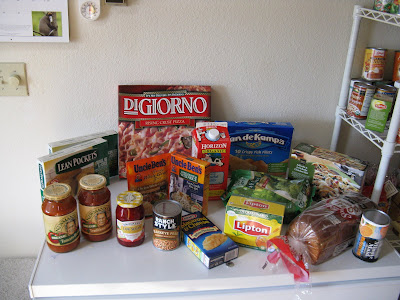I don't really know where this comes from, but here's how it works:
1) Look at the list and bold those you have read.
2) Italicize those you started but did not finish.
3) Underline the books you LOVE. (Note from Tam: I am going to underline any books I did love, even if I don't love them anymore.)
4) Reprint this list in your own blog so we can try and track down these people who’ve read 6 or less and force books upon them.
1. The Time Traveller’s Wife - Audrey Niffenegger
2.
The Hitch Hiker’s Guide to the Galaxy - Douglas Adams
3.
The Handmaid’s Tale - Margaret Atwood
4.
Lord of the Flies - William Golding
5.
Life of Pi - Yann Martel
6.
The Secret Garden - Frances Hodgson Burnett
7.
The Color Purple - Alice Walker
8. Adventures of Sherlock Holmes - Sir Arthur Conan Doyle
9.
Jane Eyre - Charlotte Bronte
10.
To Kill a Mockingbird - Harper Lee
11.
Wuthering Heights - Emily Bronte
12.
Nineteen Eighty Four - George Orwell
13.
His Dark Materials (trilogy) - Philip Pullman
14.
Great Expectations - Charles Dickens
15.
Catch 22 - Joseph Heller
16.
The Hobbit - J.R.R. Tolkien
17.
Catcher in the Rye - J.D. Salinger
18. Brideshead Revisited - Evelyn Waugh
19. Crime and Punishment - Fyodor Dostoyevsky
20.
Alice in Wonderland - Lewis Carroll
21.
Chronicles of Narnia - C.S. Lewis
22.
The Lion, The Witch and The Wardrobe – C.S. Lewis
23.
Winnie the Pooh - A.A. Milne
24.
Animal Farm - George Orwell
25.
Brave New World - Aldous Huxley
26.
Of Mice and Men - John Steinbeck
27. On The Road - Jack Kerouac
28.
Oliver Twist - Charles Dickens
29.
Charlotte’s Web - E.B. White
30.
Hamlet - William Shakespeare
31.
Charlie and the Chocolate Factory - Roald Dahl
32.
Complete Works of Shakespeare33.
Ulysses - James Joyce
34.
Heart of Darkness - Joseph Conrad
35.
Les Miserables - Victor Hugo
36.
Pride and Prejudice - Jane Austen
37.
The Bible38.
The Great Gatsby - F. Scott Fitzgerald
39. War and Peace - Leo Tolstoy
40.
Grapes of Wrath - John Steinbeck
41. Anna Karenina - Leo Tolstoy
42. The Kite Runner - Khaled Hosseini
43. One Hundred Years of Solitude - Gabriel Garcia Marquez
44.
Sense and Sensibility - Jane Austen
45. The Curious Incident of the Dog in the Night-time - Mark Haddon
46.
Lolita - Vladimir Nabokov
47.
The Little Prince - Antoine De Saint-Exupery
48.
A Confederacy of Dunces - John Kennedy Toole
49.
The Lord of the Rings - JRR Tolkien
50.
Harry Potter series - JK Rowling
51.
Little Women - Louisa M. Alcott
52.
Tess of the D’Urbervilles - Thomas Hardy
53. Rebecca - Daphne Du Maurier
54. Birdsong - Sebastian Faulks
55.
Middlemarch - George Eliot
56.
Gone With The Wind - Margaret Mitchell
57.
Bleak House - Charles Dickens
58.
The Wind in the Willows - Kenneth Grahame
59.
David Copperfield - Charles Dickens
60.
Emma - Jane Austen
61.
Persuasion - Jane Austen
62. Captain Corelli’s Mandolin - Louis De Bernieres
63.
Memoirs of a Geisha - Arthur Golden
64. The Da Vinci Code - Dan Brown
65. A Prayer for Owen Meaney - John Irving
66. The Woman in White - Wilkie Collins
67.
Anne of Green Gables – L.M. Montgomery
68. Far From The Madding Crowd - Thomas Hardy
69. Atonement - Ian McEwan
70.
Dune - Frank Herbert
71. Cold Comfort Farm - Stella Gibbons
72. A Suitable Boy - Vikram Seth
73. The Shadow of the Wind - Carlos Ruiz Zafon
74.
A Tale Of Two Cities - Charles Dickens
75. Love In The Time Of Cholera - Gabriel Garcia Marquez
76. The Secret History - Donna Tartt
77. The Lovely Bones - Alice Sebold
78. Count of Monte Cristo - Alexandre Dumas
79. Jude the Obscure - Thomas Hardy
80. Bridget Jones’ Diary - Helen Fielding
81. Midnight’s Children - Salman Rushdie
82. Moby Dick - Herman Melville
83. Dracula - Bram Stoker
84. Notes From A Small Island - Bill Bryson
85. The Bell Jar - Sylvia Plath
86. Swallows and Amazons - Arthur Ransome
87. Germinal - Emile Zola
88. Vanity Fair - William Makepeace Thackeray
89.
Possession - A.S. Byatt
90.
A Christmas Carol - Charles Dickens
91. Cloud Atlas - David Mitchell
92. The Remains of the Day - Kazuo Ishiguro
93.
Madame Bovary - Gustave Flaubert
94. A Fine Balance - Rohinton Mistry
95. The Five People You Meet In Heaven - Mitch Albom
96. The Faraway Tree Collection - Enid Blyton
97. The Wasp Factory - Iain Banks
98.
Watership Down – Richard Adams
99. A Town Like Alice - Nevil Shute
100. The Three Musketeers - Alexandre Dumas
 So, I was curious how this compared to my calorie intake. Assuming I might eat about 2000 calories per day (and ideally I would eat a bit less and lose weight, but in fact I think I eat a bit more, so I just chose this as a nice round number), I need 14,000 calories per week.
So, I was curious how this compared to my calorie intake. Assuming I might eat about 2000 calories per day (and ideally I would eat a bit less and lose weight, but in fact I think I eat a bit more, so I just chose this as a nice round number), I need 14,000 calories per week.



















